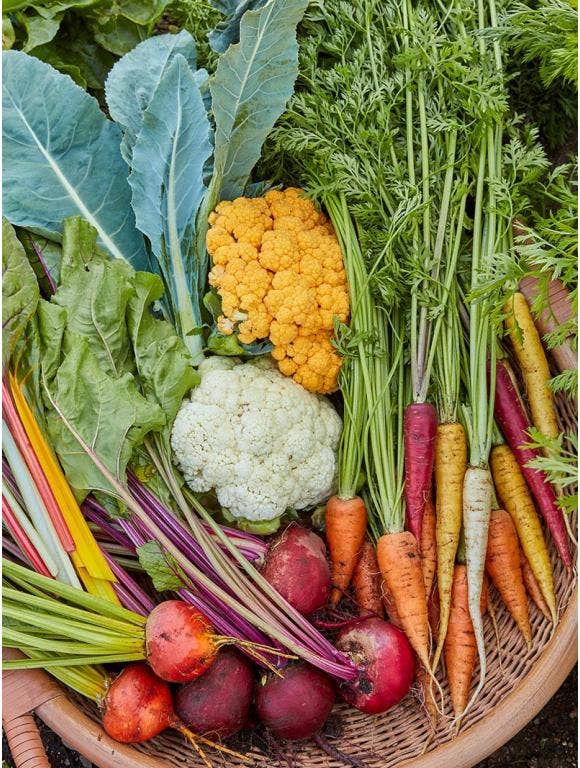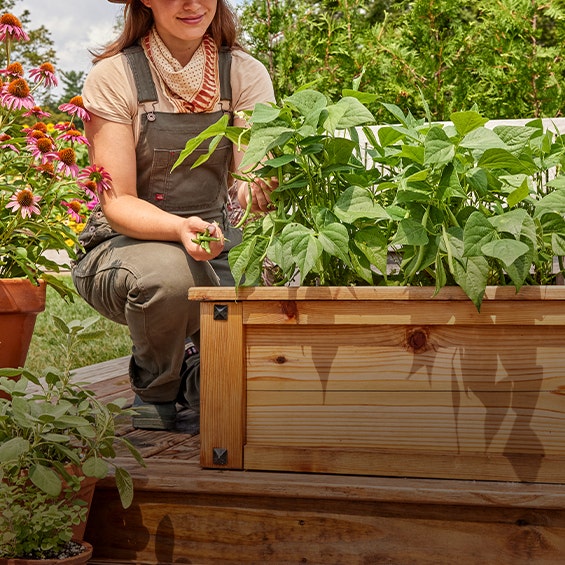


When it comes to organic gardening, there's often confusion about what the word means and how it applies to homegrown crops. So, what is organic gardening, and why is it important? Organic gardening is more than just avoiding chemicals — it's a way to work with nature to cultivate an ecosystem.
What Is Organic Gardening?
The aim of organic gardening is to produce foods using holistic practices that lessen the impact on the environment and foster growth throughout the ecosystem.
Tilling soil, using heavy equipment, and applying synthetic fertilizers and pesticides have had a detrimental effect on native ecosystems. Modern organic farming seeks to repair the damage by incorporating:
No-till/low-till soil preparation
Cover crops/crop rotation
Organically derived fertilizers
Compost
Biochar
Beneficial insects
Companion planting
Soil probiotics
How Is Commercial Organic Different From Home Organic?
To be labeled as organic, commercial produce and other products must meet the United States Department of Agriculture's (USDA) strict specifications that were established in 1990. These products need to be grown without using prohibited substances (those deemed unsafe for people and the environment) for at least three years and inspected on an annual basis.
What is organic gardening when it comes to gardening at home? If you're looking to grow crops for personal consumption, the term organic is used more loosely. This is because many cultural practices go into creating an organic garden, and you can pick and choose what's best for you. What's important is that you take steps to minimize your environmental impact.
Can Organic Gardeners Use Chemicals?
Organic gardening isn't limited to the disuse of chemicals. While organic gardening does tend to favor not using pesticides and artificial fertilizers, there are many safe alternatives to synthetics.
Some plant species have natural defenses against disease, and these naturally occurring substances can be extracted and used as relatively safe alternatives to synthetic chemicals. Two of the most common are neem oil extracted from the neem tree and pyrethrin extracted from chrysanthemums. Another natural pesticide is Bt (Bacillus thuringiensis), a bacteria that safely eliminates leaf-eating insects.
Safe non-organic pesticides can be used both indoors and out, such as insecticidal soaps, sulfur and sticky traps. These work most effectively when used in tandem with other methods. Take care when using any of the above products as spraying any chemicals or other substances harmful to pests may harm beneficial insects as well.
Organic fertilizers are a safe and effective method to deliver additional nutrients to the garden. Rather than targeting the plants directly, organic fertilizers help replenish the soil and are less likely to burn sensitive plants, including seedlings. Look for fertilizers backed by the Organic Materials Review Institute (OMRI) seal of approval to ensure the fertilizer is suitable for organic food production.
Can You Use a Greenhouse for Organic Gardening?
If you have or are looking to start a greenhouse, organic gardening can be a bit trickier but can be beneficial. Greenhouses function as micro-ecosystems largely cut off from the outside world. Separated and contained, fungi and pests tend to build rapidly, taking advantage of the higher humidity, lack of predators, and suppression of outside elements such as wind and rain.
However, you can take steps to lessen the risk of disease. When constructing the greenhouse, using artificial lights can help to improve vigor by increasing the duration and intensity of lighting. LED lighting is inexpensive, easy to install and economical. Fans are also recommended inside greenhouses. Fans increase airflow and eliminate stagnant "dead spots" where mold and fungi could otherwise thrive. Solar panels are an excellent way to run low-energy fans throughout the growing season with minimal cost or effort.
How Do You Plan for an Organic Garden or Greenhouse?
Whether you're looking to start an organic garden or organic greenhouse, planning is crucial. Create a list of the plants you're interested in growing or currently have in the ground. Observe their growth, their strengths and their weaknesses. What grows well in one region might do poorly in another, and many issues can be avoided simply by planting those best adapted to where you live.
Implement Diversity and Crop Rotation
Diversity is an important component of organic gardening. It mimics a more naturalistic environment where it's difficult for any one pest to run rampant. When planning your garden, look to diversify the number of species sharing a given space and adjust the planting locations annually for seasonal crops to minimize a buildup of pests within the soil. Each year, track where you plant your crops and when possible, rotate them to avoid planting the same crops in the same location as the previous year. This tactic is called crop rotation and when coupled with cover crops, such as alfalfa or winter rye, can greatly reduce the risk of disease.
Think About Companion Planting
Companion planting is another beneficial practice that leverages the benefits of a diverse garden. By planting plants that grow well together (such as tomatoes and 'Nema-Gone' marigolds or corn and pole beans) or including nectar-rich flowers like borage to attract pollinators to crops, each plant benefits from those around it.
Be Aware of Pests and Disease
Be prepared to use multiple tactics to battle diseases, especially in the first few years. Inevitably, there will be instances of common pests such as hornworms or whiteflies, but this doesn't mean you've failed. Organic gardening takes a naturalistic approach by focusing on pest management rather than pest eradication. Over time, by building a diverse garden with rich soils and abundant habitat for beneficial insects, pests will decline.
Plan for Waste
Finally, it's essential to plan for waste. While organic gardening typically produces less waste than traditional practices, the lack of toxins means leaves, sticks and clippings can also be recycled back into the soil without harming microbiota. With this process of recycling detritus, the soil's organic matter is replenished by feeding beneficial microorganisms and creating compost.
Organic gardening is just a start to living more sustainably. For more information, check out Zero Waste Habits for Gardeners to Try and What Is Green Manure, and How Does It Benefit a Garden?



